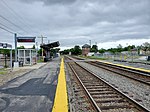Ayer, Massachusetts
1667 establishments in the Massachusetts Bay ColonyAyer, MassachusettsPages with plain IPAPopulated places established in 1667Towns in Massachusetts ... and 2 more
Towns in Middlesex County, MassachusettsUse mdy dates from July 2023

Ayer ( AIR) is a town in Middlesex County, Massachusetts, United States. Originally part of Groton, it was incorporated February 14, 1871, and became a major commercial railroad junction. The town was home to Camp Stevens, a training camp for Massachusetts volunteers during the American Civil War. Later, Fort Devens was established by the federal government to train New England soldiers for World War I. Fort Devens is a major influence on the area, although it is considerably smaller than when it was first closed in the mid-1990s. The town's population was 8,479 at the 2020 census.
Excerpt from the Wikipedia article Ayer, Massachusetts (License: CC BY-SA 3.0, Authors, Images).Ayer, Massachusetts
Park Street,
Geographical coordinates (GPS) Address Nearby Places Show on map
Geographical coordinates (GPS)
| Latitude | Longitude |
|---|---|
| N 42.561111111111 ° | E -71.590277777778 ° |
Address
Park Street 7
01432
Massachusetts, United States
Open on Google Maps









